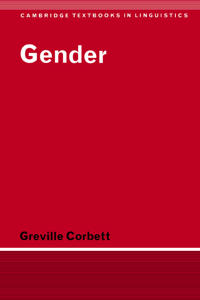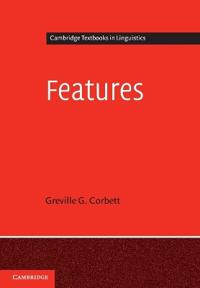The Slavonic Languages (Pocket)
avGreville G. Corbett
ISBN: 9780415280785 - UTGIVEN: 2002-05-30Providing chapter length descriptions of each of the modern Slavonic languages and the extinct Slavonic languages, this book describes their social context, phonology, sychronic morphology, vocabulary and syntactic properties.[...]
Agreement (Häftad)
avGreville G. Corbett
ISBN: 9780521001700 - UTGIVEN: 2006-06Agreement in language relates to the correspondence between words in a sentence, in terms of gender, case, person, or number. For example, in the sentence 'he runs', the suffix -s 'agrees' in number with the singular pronoun 'he'. Patterns of agreement vary dramatically cross-linguistically, with[...]
Gender (Häftad)
avGreville G. Corbett
ISBN: 9780521338455 - UTGIVEN: 199104Gender is a fascinating category, central and pervasive in some languages and totally absent in others. In this new, comprehensive account of gender systems, over 200 languages are discussed, from English and Russian to Archi and Chichewa. Detailed analysis of individual languages provides clear ill[...]
Features (Pocket)
avGreville G. Corbett
ISBN: 9781107661080 - UTGIVEN: 201211Features are a central concept in linguistic analysis. They are the basic building blocks of linguistic units, such as words. For many linguists they offer the most revealing way to explore the nature of language. Familiar features are Number (singular, plural, dual, ...), Person (1st, 2nd, 3rd) and[...]
The Expression of Gender (Häftad)
avGreville G. Corbett
ISBN: 9783110354140 - UTGIVEN: 2015-02Gender is a fascinating category, which has grown steadily in importance across the humanities and social sciences. The book centres on the core of the category within language. Each of the seven contributions provides an independent account of a key part of the topic, ranging from gender and sex, g[...]
Understanding and Measuring Morphological Complexity (Inbunden)
avMatthew (EDT) Baerman, Dunstan (EDT) Brown, Greville G. (EDT) Corbett
ISBN: 9780198723769 - UTGIVEN: 2015-05This book aims to assess the nature of morphological complexity, and the properties that distinguish it from the complexity manifested in other components of language. Of the many ways languages have of being complex, perhaps none is as daunting as what can be achieved by inflectional morphology: th[...]








